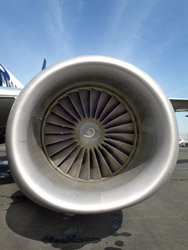Better control of efficiency and environmental impact
The ‘Development of advanced actuation concepts to provide a step change in technology used in future aero-engine control systems’ (Advact) project was designed to improve operation and availability of gas turbines while simultaneously decreasing cost and environmental impact. The technical objective was provision of extended in-flight actuation and control of engine parameters. First, the investigators modulated boundary layers within the intake to enhance the ability of the airflow to remain ‘attached’ to the surface over which it flows. Modelling experiments demonstrated a significant reduction of drag with the new flow control methodologies. They then evaluated the use of shape memory alloys (SMAs) for actuator production. Traditional SMAs had been produced only in very small segments due to technical limitations in part associated with the metals themselves. The Advact project developed improved alloys and large actuator coating methods enabling major advances in the design of SMA-based actuators. Next, they developed a technology to produce high temperature electromagnetic (EM) actuators suitable for use in gas turbines unable to take advantage of conventional lower temperature EM actuators. Finally, the researchers effectively addressed control of engine rotor vibration. Excessive vibration is of critical concern, as it leads to increased wear, decreased engine efficiency, increased CO2 emissions and loss of cabin comfort. Thus, the Advact project resulted in significant technological improvements to gas turbine control systems for aircraft that should have far-reaching impact on efficient and cost-effective design and manufacturing as well as consumer and environmental safety.







